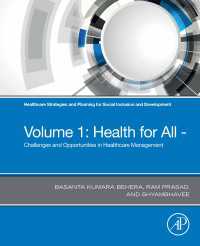Description
**Selected for Doody's Core Titles® 2024 in Medical/Surgical** Learn the clinical judgment skills you need to succeed on the Next-Generation NCLEX® Exam and in medical-surgical nursing practice with Iggy's trendsetting, concept-based approach! From a team of nursing experts led by Donna Ignatavicius, Medical-Surgical Nursing: Concepts for Clinical Judgment and Collaborative Care, 11th Edition provides a solid foundation in medical-surgical nursing care that is patient-centered, evidence-based, and collaborative. In each chapter, content is organized by the most important concepts of care followed by commonly occurring exemplars for each concept. This perennial bestseller helps you learn to think like a nurse and learn how to apply your knowledge in the classroom, simulation laboratory, and clinical settings.- UNIQUE! Unparalleled focus on clinical judgment and systems thinking ensures alignment with the NCSBN Clinical Judgment Measurement Model and emphasizes the six cognitive skills that you'll need in order to develop effective clinical judgment, to succeed when taking the Next-Generation NCLEX® Exam (NGN), and to enter clinical practice as a safe, competent, compassionate generalist nurse.- UNIQUE! Data-driven Concept and Exemplar selections provide a strong foundation in professional nursing concepts and health and illness concepts, with application in each chapter.- UNIQUE! Exceptional emphasis on NGN preparation includes chapter-opening Learning Outcomes and chapter-ending Get Ready for the Next-Generation NCLEX Examination! sections, plus NCLEX Examination Challenge questions and Mastery and NGN Questions, with an answer key including rationales on the Evolve website.- Consistent use of interprofessional terminology promotes interprofessional collaboration through the use of a common healthcare language, instead of using nursing-specific diagnostic language.- Emphasis on patient safety highlights safety and evidence-based practice with Nursing Safety Priority boxes, as well as Drug Alert, Critical Rescue, and Action Alert boxes.- Focus on care coordination and transition management addresses the continuity of care between acute care and community-based care.- Direct, easy-to-read writing style features concise sentences and straightforward vocabulary, making this one of the most readable medical-surgical nursing textbooks available.- Sherpath (sold separately) for Ignatavicius et al. Medical-Surgical Nursing, 11th Edition provides an interactive, adaptive learning experience!
Table of Contents
UNIT I: Essential Concepts of Medical-Surgical Nursing1. Overview of Professional Nursing Concepts for Medical-Surgical Nursing 2. Clinical Judgment and Systems Thinking 3. Overview of Health Concepts for Medical-Surgical Nursing 4. Concepts of Care for Older Adults 5. Concepts of Care for Transgender and Non-Binary Patients 6. Assessment and Concepts of Care for Patients with Pain 7. Concepts of Rehabilitation for Chronic and Disabling Health Conditions 8. Concepts of Care for Patients at End-of-Life 9. Concepts of Care for Perioperative Patients UNIT II: Concepts of Emergency Care and Disaster Preparedness10. Concepts of Emergency and Trauma Nursing 11. Concepts of Care for Patients with Common Environmental Emergencies 12. Concepts of Disaster Preparedness UNIT III: Concepts of Fluid, Electrolyte, and Acid-Base Balance and Imbalance 13. Concepts of Fluid and Electrolyte Balance and Imbalance 14. Concepts of Acid-Base Balance and Imbalance 15. Concepts of Infusion Therapy UNIT IV: Interprofessional Collaboration for Patients with Immunity Conditions16. Concepts of Inflammation and Immunity 17. Concepts of Care for Patients with Allergy and Immunity Conditions 18. Concepts of Care for Patients with Cancer 19. Concepts of Care for Patients with Infection UNIT V: Interprofessional Collaboration for Patients with Integumentary System Conditions20. Assessment of the Skin, Hair, and Nails 21. Concepts of Care for Patients with Conditions of the Skin, Hair, and Nails UNIT VI: Interprofessional Collaboration for Patients with Respiratory System Conditions 22. Assessment of the Respiratory System 23. Concepts of Care for Patients with Noninfectious Upper Respiratory Conditions 24. Concepts of Care for Patients with Noninfectious Lower Respiratory Conditions 25. Concepts of Care for Patients with Infectious Respiratory Conditions 26. Critical Care of Patients with Respiratory Emergencies UNIT VII: Interprofessional Collaboration for Patients with Cardiovascular System Conditions27. Assessment of the Cardiovascular System 28. Concepts of Care for Patients with Dysrhythmias 29. Concepts of Care for Patients with Cardiac Conditions 30. Concepts of Care for Patients with Vascular Conditions 31. Critical Care of Patients with Shock 32. Critical Care of Patients with Acute Coronary Syndromes UNIT VIII: Interprofessional Collaboration for Patients with Hematologic System Conditions33. Assessment of the Hematologic System 34. Concepts of Care for Patients with Hematologic Conditions UNIT IX: Interprofessional Collaboration for Patients with Nervous System Conditions35. Assessment of the Nervous System 36. Concepts of Care for Patients with Conditions of the Central Nervous System: The Brain 37. Concepts of Care for Patients with Conditions of the Central Nervous System: The Spinal Cord 38. Critical Care of Patients with Neurologic Emergencies UNIT X: Interprofessional Collaboration for Patients with Sensory System Conditions 39. Assessment and Concepts of Care for Patients with Eye and Vision Conditions 40. Assessment and Concepts of Care for Patients with Ear and Hearing ConditionsUNIT XI: Interprofessional Collaboration for Patients with Musculoskeletal System Conditions41. Assessment of the Musculoskeletal System 42. Concepts of Care for Patients with Musculoskeletal Conditions 43. Concepts of Care for Patients with Arthritis and Total Joint Arthroplasty 44. Concepts of Care for Patients with Musculoskeletal Trauma UNIT XII: Interprofessional Collaboration for Patients with Gastrointestinal System Conditions 45. Assessment of the Gastrointestinal System 46. Concepts of Care for Patients with Oral Cavity and Esophageal Conditions 47. Concepts of Care for Patients with Stomach Conditions 48. Concepts of Care for Patients with Noninflammatory Intestinal Conditions 49. Concepts of Care for Patients with Inflammatory Intestinal Conditions 50. Concepts of Care for Patients with Liver Conditions 51.







